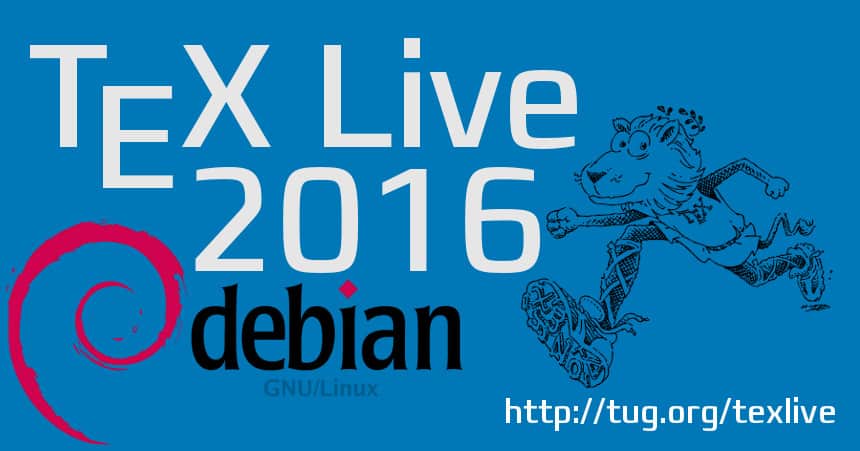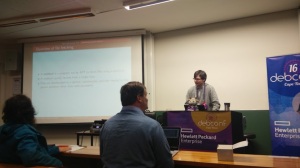Chris Lamb: Free software activities in October 2016
 Here is my monthly update covering what I have been doing in the free software world (previously):
Here is my monthly update covering what I have been doing in the free software world (previously):
- Made a large number of improvements to travis.debian.net, my hosted service for projects that host their Debian packaging on GitHub to use the Travis CI continuous integration platform to test builds on every code change:
- Enabled the use of Git submodules. Thanks to @unera & @hosiet. (#30)
- Managed a contribution from @xhaakon to allow adding an extra repository for custom dependencies. (#17)
- Fixed an issue where builds did not work under Debian Wheezy or Ubuntu Trusty due to a call to dpkg-buildpackage --show-field. (#28)
- Fixed an issue where TRAVIS_DEBIAN_EXTRA_REPOSITORY was accidentally required. (#27)
- Made a number of miscellaneous cosmetic improvements. (f7e5b080 & 037de91cc, etc.)
- Submitted a pull request to Alabaster, the default theme for the Python Sphinx documentation system, to ensure that "extra navigation links" are rendered reproducibly. (#90)
- Improved my Chrome extension for the FastMail web interface:
- Managed a pull request from @jlerner to add an optional confirmation dialogue before sending any message. (#10)
- Added an optional Ctrl+Enter alias for Alt+Enter to limit searches to the current folder; the latter shortcut is already mapped by my window manager. (d691b07)
- Various cosmetic changes to the options page. (7b95e887 & 833ff0fe)
- Submitted two pull requests to mypy, an experimental static type checker for Python:
- Updated django-slack, my library to easily post messages to the Slack group-messaging utility:
- Merged a feature from @lvpython to add an option to post the message as the authenticated user rather than the specified one. (#59)
- Merged a documentation update from @ataylor32 regarding the new method of generating access tokens. (#58)
- Made a number of cosmetic improvements to AptFs, my FUSE-based filesystem that provides a view on unpacked Debian source packages as regular folders.
- Updated the SSL certificate for try.diffoscope.org, a hosted version of the diffoscope in-depth and content-aware diff utility. Continued thanks to Bytemark for sponsoring the hardware.
Whilst anyone can inspect the source code of free software for malicious flaws, most GNU/Linux distributions provide binary (or "compiled") packages to end users. The motivation behind the Reproducible Builds effort is to allow verification that no flaws have been introduced either maliciously and accidentally during this compilation process by promising identical binary packages are always generated from a given source.
Presented a talk entitled "Reproducible Builds" talk at Software Freedom Kosova, in Prishtina, Republic of Kosovo.
I filed my 2,500th bug in the Debian BTS: #840972: golang-google-appengine: accesses the internet during build.
In order to build packages reproducibly, one not only needs identical sources but also some external and sharable definition of the environment used for a particular build, stipulating such things such as the version numbers of the required build-dependencies. It is not currently clear how to handle these .buildinfo files after the archive software has processed them and how to make them available to the world so I started development on a proof-of-concept server to see what issues arise in practice. It is available at buildinfo.debian.net.
Chaired an IRC meeting and ran a poll to determine a regular time .
Submitted two design proposals to our wiki page.
Improvements to our tests.reproducible-builds.org testing framework:
- Move regular "Scheduled in..." messages to the #debian-reproducible-changes IRC channel.
- Use our log_info method instead of manual echo calls.
- Correct an "all sources packages" "all source packages" typo.
- Submit .buildinfo files to buildinfo.debian.net.
- Create GPG key on nodes for buildinfo.debian.net at deploy time, not "lazily".
- Seven days of "frontdesk" duties, triaging CVEs, etc.
- Issued DLA 647-1 for freeimage correcting an out-of-bounds write vulnerability in the XMP image handling functionality.
- Issued DLA 649-1 for python-django fixing a possible CSRF protection bypass on sites that use Google Analytics.
- Issued DLA 654-1 for libxfixes preventing an integer overflow when a malicious client sent INT_MAX as a "length".
- Issued DLA 662-1 for quagga correcting a programming error where two constants were confused that could cause stack overrun in IPv6 routing code.
- Issued DLA 688-1 for cairo to prevent a DoS attack where a malicious SVG could generate invalid pointers.
- python-debian: Missing chardet from setup.py depends
- lintian: Drop double spaces in includes-maintscript paragraph
- db5.3: maintscript includes "maint-script parameters"
- dracut: maintscript includes "maint-script parameters"
- gunicorn:
- 19.6.0-7 Set supplementary groups when changing uid, add an example systemd .service file to gunicorn-examples, and expand README.Debian to make it clearer what to do now that /etc/gunicorn.d has been removed.
- 19.6.0-8 Correct previous supplementary groups patch to be compatible with Python 3.
- redis:
- 3:3.2.4-2 Ensure that sentinel's configuration actually writes to a pidfile location so that systemd can detect that the daemon has started.
- 3:3.2.5-1 New upstream release.
- libfiu:
- 0.94-8 Fix FTBFS under Bash due to lack of && in debian/rules.
- 0.94-9 Ensure the build is reproducible by sorting injected modules.
- aptfs (2:0.8-2) Minor cosmetic changes.
- zeroinstall-injector (2.12-2) on behalf of Thomas Leonard.
- librep (0.92.6-1) on behalf of Jose M Calhariz.
- xloadimage (4.1-24) on behalf of Dominik George.
- libxml-dumper-perl (0.81-1.2) Move away from a unsupported debhelper compat level 4.
- netatalk (2.2.5-1.1) Drop build-dependency on hardening-includes.
- anon-proxy (00.05.38+20081230-4) Move to a supported debhelper compatibility level 9.
- ara (1.0.32) Make the build reproducible.
- binutils-m68hc1x (1:2.18-8) Make the build reproducible & move to a supported debhelper compatibility level.
- fracplanet (0.4.0-5) Make the build reproducible.
- libnss-ldap (265-5) Make the build reproducible.
- python-uniconvertor (1.1.5-3) Fix an "option release requires an argument" FTBFS. (#839375)
- ripole (0.2.0+20081101.0215-3) Actually include the ripole binary in package. (#839919) & enable hardening flags.
- twitter-bootstrap (2.0.2+dfsg-10) Fix incorrect copyright formatting when building under Bash. (#824592)
- zpaq (1.10-3) Make the build reproducible.
- flex: Not compiled with -fPIC
- lintian: init.d-script-needs-depends-on-lsb-base does not use strict enough version for status_of_proc
- qa.debian.org: UDD upload_history table has stopped updating
 I m proud (yes, really) to announce DNS66, my host/ad blocker for Android 5.0 and newer. It s been around since last Thursday on F-Droid, but it never really got a formal announcement.
DNS66 creates a local VPN service on your Android device, and diverts all DNS traffic to it, possibly adding new DNS servers you can configure in its UI. It can use hosts files for blocking whole sets of hosts or you can just give it a domain name to block (or multiple hosts files/hosts). You can also whitelist individual hosts or entire files by adding them to the end of the list. When a host name is looked up, the query goes to the VPN which looks at the packet and responds with NXDOMAIN (non-existing domain) for hosts that are blocked.
You can find DNS66 here:
I m proud (yes, really) to announce DNS66, my host/ad blocker for Android 5.0 and newer. It s been around since last Thursday on F-Droid, but it never really got a formal announcement.
DNS66 creates a local VPN service on your Android device, and diverts all DNS traffic to it, possibly adding new DNS servers you can configure in its UI. It can use hosts files for blocking whole sets of hosts or you can just give it a domain name to block (or multiple hosts files/hosts). You can also whitelist individual hosts or entire files by adding them to the end of the list. When a host name is looked up, the query goes to the VPN which looks at the packet and responds with NXDOMAIN (non-existing domain) for hosts that are blocked.
You can find DNS66 here:
 Finally a new update of many TeX related packages: all the texlive-* including the binary packages, and biber have been updated to the latest release. This upload was delayed by my travels around the world, as well as the necessity to package a new Perl module (
Finally a new update of many TeX related packages: all the texlive-* including the binary packages, and biber have been updated to the latest release. This upload was delayed by my travels around the world, as well as the necessity to package a new Perl module ( There are several highlights: The binaries have been patched with several upstream fixes (tex4ht and XeTeX compatibility, as well as various Japanese TeX engine fixes), updated biber and biblatex, and as usual loads of new and updated packages.
Last but not least I want to thank one particular author: His package was removed from TeX Live due to the addition of a rather unusual clause in the license. Instead of simply uploading new packages to Debian with the rather important removed, I contacted the author and asked for clarification. And to my great pleasure he immediately answered with an update of the package with fixed license.
All of us user of these many packages should be grateful to the authors of the packages who invest loads of their free time into supporting our community. Thanks!
Enough now, here as usual the list of new and updated packages with links to their respective CTAN pages. Enjoy.
New packages
There are several highlights: The binaries have been patched with several upstream fixes (tex4ht and XeTeX compatibility, as well as various Japanese TeX engine fixes), updated biber and biblatex, and as usual loads of new and updated packages.
Last but not least I want to thank one particular author: His package was removed from TeX Live due to the addition of a rather unusual clause in the license. Instead of simply uploading new packages to Debian with the rather important removed, I contacted the author and asked for clarification. And to my great pleasure he immediately answered with an update of the package with fixed license.
All of us user of these many packages should be grateful to the authors of the packages who invest loads of their free time into supporting our community. Thanks!
Enough now, here as usual the list of new and updated packages with links to their respective CTAN pages. Enjoy.
New packages
 If you want, sicherboot automatically creates db, KEK, and PK keys, and puts the public keys on your EFI System Partition (ESP) together with the KeyTool tool, so you can enroll the keys in UEFI. You can of course also use other keys, you just need to drop a db.crt and a db.key file into
If you want, sicherboot automatically creates db, KEK, and PK keys, and puts the public keys on your EFI System Partition (ESP) together with the KeyTool tool, so you can enroll the keys in UEFI. You can of course also use other keys, you just need to drop a db.crt and a db.key file into  A week has gone by and another small sharing about Doha and one package that quite a few of us use everyday but don t think much of them.
Let s start with Doha with these two pictures which tells/shares a bit about what the Doha of today is like
A week has gone by and another small sharing about Doha and one package that quite a few of us use everyday but don t think much of them.
Let s start with Doha with these two pictures which tells/shares a bit about what the Doha of today is like




 In 2016-06-18:
In 2016-06-18:
 Numbers
The
Numbers
The  Julian has
Julian has

 What happened in the
What happened in the  Those of you not interested in boring and melancholic look-back onto history can safely skip reading this one. For those a bit interested in the history of TeX in Debian, please read on.
Debian releases and TeX systems
The TeX system of choice has been for long years
Those of you not interested in boring and melancholic look-back onto history can safely skip reading this one. For those a bit interested in the history of TeX in Debian, please read on.
Debian releases and TeX systems
The TeX system of choice has been for long years  Development over the years
TeX Live 2005 was just another TeX system but not the preferred one in Debian Etch and beyond. But then in May 2006, Thomas Esser announced the end of development of teTeX, which cleared the path for TeX Live as main TeX system in Debian (and the world!). The next release of Debian, Lenny (1/2009), already carried only TeX Live. Unfortunately it was only TeX Live 2007 and not 2008, mostly due to me having been involved in rewriting the upstream infrastructure based on Debian package files instead of the notorious xml files. This took quite a lot of attention and time from Debian away to upstream development, but this will be discussed in a different post.
Similarly, the release of TeX Live included in Debian Squeeze (released 2/2011) was only TeX Live 2009 (instead of 2010), but since then (Wheezy and Jessie) the releases of TeX Live in Debian were always the latest released ones.
Current status
Since about 2013 I am trying to keep a regular schedule of new TeX Live packages every month. These helps me to keep up with the changes in upstream packaging and reduces the load of packaging a new release of TeX Live. It also bring to users of unstable and testing a very up-to-date TeX system, where packages at most lack 1 month of behind the TeX Live net updates.
Future
As most of the readers here know, besides caring for TeX (Live) and related packages in Debian, I am also responsible for the TeX Live Manager (tlmgr) and most of upstream s infrastructure including network distribution. Thus, my (spare, outside work) time needs to be distributed between all these projects (and some others) which leaves less and less time for Debian packaging. Fortunately the packaging is in a state that making regular updates once a month is less of a burden, since most steps are automatized. What is still a bit of a struggle is adapting the binary package (
Development over the years
TeX Live 2005 was just another TeX system but not the preferred one in Debian Etch and beyond. But then in May 2006, Thomas Esser announced the end of development of teTeX, which cleared the path for TeX Live as main TeX system in Debian (and the world!). The next release of Debian, Lenny (1/2009), already carried only TeX Live. Unfortunately it was only TeX Live 2007 and not 2008, mostly due to me having been involved in rewriting the upstream infrastructure based on Debian package files instead of the notorious xml files. This took quite a lot of attention and time from Debian away to upstream development, but this will be discussed in a different post.
Similarly, the release of TeX Live included in Debian Squeeze (released 2/2011) was only TeX Live 2009 (instead of 2010), but since then (Wheezy and Jessie) the releases of TeX Live in Debian were always the latest released ones.
Current status
Since about 2013 I am trying to keep a regular schedule of new TeX Live packages every month. These helps me to keep up with the changes in upstream packaging and reduces the load of packaging a new release of TeX Live. It also bring to users of unstable and testing a very up-to-date TeX system, where packages at most lack 1 month of behind the TeX Live net updates.
Future
As most of the readers here know, besides caring for TeX (Live) and related packages in Debian, I am also responsible for the TeX Live Manager (tlmgr) and most of upstream s infrastructure including network distribution. Thus, my (spare, outside work) time needs to be distributed between all these projects (and some others) which leaves less and less time for Debian packaging. Fortunately the packaging is in a state that making regular updates once a month is less of a burden, since most steps are automatized. What is still a bit of a struggle is adapting the binary package (